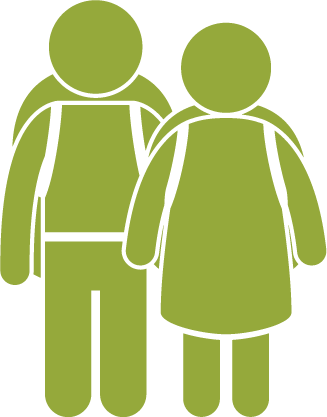
After a turbulent 2020-2021 school year, it is more important than ever that educators have feasible and effective options to support students’ foundational social-emotional skills. Prior studies have found that students who participate in social-emotional learning (SEL) programs improve their behavioral and academic functioning and reduce their challenging behaviors.1 When selecting an SEL program, educators should pay particular attention to the evidence base to see if the program shows impacts on the outcomes of interest for students and educators.
Our research team at SRI Education recently completed a three-year study of Tools for Getting Along (TFGA), a classroom-based intervention designed to help upper elementary teachers establish a positive, cooperative classroom atmosphere while students become more effective and proactive social problem solvers. We conducted an effectiveness study, which means we examined the effects of TFGA under “real-world” conditions. In this post, we provide an overview of TFGA, describe the effectiveness study, and highlight the positive impacts TFGA had on students’ executive functioning and social skills.
What is Tools for Getting Along (TFGA)?

What educators should know
Tools for Getting Along (TFGA) can build students’ foundational social-emotional skills. In a three-year study of TFGA, the SRI research team found that students who participated in TFGA (compared to those who did not) had:
- Higher levels of executive functioning (i.e., behavioral, cognitive, and emotional regulation), especially those who had lower functioning at the start of the study.
- Stronger social socials skills in their interactions with peers and adults.
- Less internalizing behaviors (e.g., worry, anxiety) if they demonstrated higher levels at the start of the study.
Greater knowledge of the problem-solving steps taught in TFGA.
Study Participants
 3 States |
 50 Elementary Schools |
 135 Teachers |
 1,793 Grade 4 Students |
- A classroom-based social emotional learning (SEL) program that teaches students social problem-solving skills to reduce aggression and improve prosocial skills and behavior.
- A manualized curriculum, including 21 core lessons delivered twice per week and 6 “booster” lessons delivered once per week.
- A collection of interactive lessons that introduces new concepts, engages students in brainstorming and discussions, and guides students in practicing new skills.
Data Collection
- The SRI research team started the study in fall 2017 and completed it in spring 2021.
- Students and teachers in schools located in California, Kentucky, and Oklahoma participated in the study.
- The SRI research team randomly selected half of the schools where teachers implemented TFGA; the other half continued their typical practices.
- Developers of TFGA conducted a 1.5-day training for all teachers implementing the program at the beginning of the year; grade 4 teachers at those schools implemented TFGA in their classrooms that year.
- The SRI research team surveyed participating students and their teachers, and we observed teachers implementing TFGA.
TFGA Implementation
– Teacher implementing TFGA
- On average, teachers spent about 30 minutes on each TFGA lesson.
- SRI researchers who observed a sample of the TFGA lessons found that teachers completed 88% of the key components and delivered most lessons (90%) with average or higher quality.
- Teachers who implemented TFGA reported that they “agree” or “strongly agree” students understand the content (88%), and the curriculum is easy to use (88%) and useful for teaching age-appropriate behavior (85%).
Teacher-Reported Outcomes
135 teachers completed the following measures:
Executive function skills help children regulate their thoughts and behaviors and are the foundation for social-emotional skills.
- Behavior Rating Inventory of Executive Function–Teacher Form (BRIEF): Teachers rated students on their abilities to inhibit impulses, modify behavior in response to changing goals, manage emotions, and cognitively manage tasks and monitor performance (63 items).
- Clinical Assessment of Behavior Teacher Rating Form (CAB): Teachers rated students on internalizing behavior (e.g., anxiety, worry), externalizing behavior (e.g., aggression, outbursts), social skills (e.g., encouraging others), and academic competence (e.g., learning new things easily) (70 items).
What we learned:
- Students who participated in TFGA displayed higher levels of executive functioning at the end of the school year than students who did not receive the curriculum. Students who had lower executive functioning skills at the start of the program benefited more.
- Areas of executive functioning that were stronger in TFGA students included behavioral regulation (e.g., staying in their seat), emotional regulation (e.g., calming down when angry), and cognitive regulation (e.g., thinking before acting).
- Students who participated in TFGA displayed stronger social skills when interacting with peers and adults (e.g., listening attentively to others) at the end of the school year.
- Students who had higher levels of internalizing behaviors (e.g., withdrawn, anxious, nervous) at the beginning of the study showed lower levels of internalizing behaviors after the program.
- These findings indicate that TFGA can build skills that help students to control and coordinate their thoughts and behaviors, which is an important part of relationship building and problem-solving.
Table 1: Impact of TFGA on teacher-reported student outcomes.
| Outcomes | p-value | |
| BRIEF behavioral regulation | <0.01* | |
| BRIEF emotional regulation | 0.02* | |
| BRIEF cognitive regulation | 0.01* | |
| BRIEF total score | <0.01* | |
| CAB internalizing | 0.32 | |
| CAB externalizing | 0.09 | |
| CAB social skills | 0.03* | |
| CAB competence | 0.08 | |
Note: BRIEF n = 1734 students, CAB n = 1676 students. All models controlled for baseline scores; student gender, race, age, and English proficiency; school-level percentage of students qualifying for free and reduced-price lunch; and cohort indicators. All continuous independent variables are grand mean centered. All missing demographic covariates were adjusted using dummy variable approach.2 Significant findings (p < .05) are marked with an *

What should educators look for in Table 1?
P-value: This indicates whether a finding has reached statistical significance. In this case, we consider findings with p values less than .05 to be significant (see those with bold and *).
Improvement index: The expected change in percentile rank for an average comparison group student if the student had received the intervention.
Student-Reported Outcomes
1,792 grade 4 students completed a survey at the beginning and end of the school year to rate their abilities to recognize and control anger and their approaches to solving problems.
What we learned:
- Students who participated in TFGA were able to recall an average of 61% of the key components taught in the TFGA program, which indicates TFGA strategies are teachable and learnable for elementary school students.
- Grade 4 students who participated in the TFGA program did not report other positive, statistically significant changes in their ability to regulate their anger or demonstrate problem-solving behaviors.
Additional Resources
For more information about the Tools for Getting Along, visit the program website: https://education.ufl.edu/behavior-management-resource-guide/tools-for-getting-along-curriculum/
If you have questions about the Tools for Getting Along study, contact the study leads:
| Carl Sumi Co-Principal Investigator carl.sumi@sri.com Phone: 650-859-3135 |
Michelle Woodbridge Co-Principal Investigator michelle.woodbridge@sri.com Phone: 650-859-6923 |
The research reported here was supported by the Institute of Education Sciences, U. S. Department of Education, through Grant R324A160010 to SRI International. The opinions expressed are those of the authors and do not represent views of the Institute or the U.S. Department of Education.
Footnotes
1 Durlak, J. A., Weissberg, R. P., Dymnicki, A. B., Taylor, R. D., & Schellinger, K. B. (2011). The impact of enhancing students’ social and emotional learning: A meta-analysis of school-based universal interventions. Child Development, 82, 405-432.
2 Puma, Michael J., Robert B. Olsen, Stephen H. Bell, and Cristofer Price (2009). What to Do When Data Are Missing in Group Randomized Controlled Trials (NCEE 2009-0049). Washington, DC: National Center for Education Evaluation and Regional Assistance, Institute of Education Sciences, U.S. Department of Education.
Topics: Classroom-based intervention Featured Resource School-based supports and systems Social-emotional learning
Tags: Classroom Climate Classroom Management Implementation SEL
